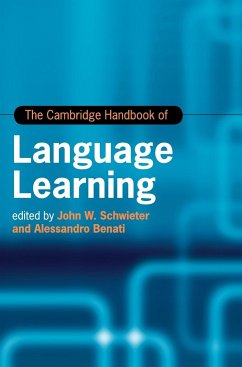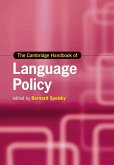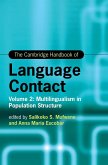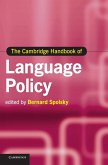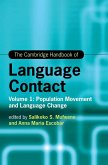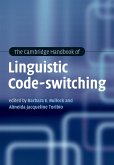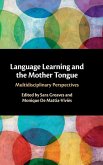The Cambridge Handbook of Language Learning
Herausgeber: Benati, Alessandro; Schwieter, John W.
The Cambridge Handbook of Language Learning
Herausgeber: Benati, Alessandro; Schwieter, John W.
- Gebundenes Buch
- Merkliste
- Auf die Merkliste
- Bewerten Bewerten
- Teilen
- Produkt teilen
- Produkterinnerung
- Produkterinnerung
A comprehensive survey of cutting-edge work on second language learning covering linguistic, psycholinguistic, processing-based, and cognitive approaches.
Andere Kunden interessierten sich auch für
![The Cambridge Handbook of Language Policy The Cambridge Handbook of Language Policy]() The Cambridge Handbook of Language Policy49,99 €
The Cambridge Handbook of Language Policy49,99 €![The Cambridge Handbook of Language Contact The Cambridge Handbook of Language Contact]() The Cambridge Handbook of Language Contact166,99 €
The Cambridge Handbook of Language Contact166,99 €![The Cambridge Handbook of Language Policy The Cambridge Handbook of Language Policy]() The Cambridge Handbook of Language Policy222,99 €
The Cambridge Handbook of Language Policy222,99 €![The Cambridge Handbook of Language Contact The Cambridge Handbook of Language Contact]() The Cambridge Handbook of Language Contact167,99 €
The Cambridge Handbook of Language Contact167,99 €![The Cambridge Handbook of Linguistic Code-switching The Cambridge Handbook of Linguistic Code-switching]() The Cambridge Handbook of Linguistic Code-switching71,99 €
The Cambridge Handbook of Linguistic Code-switching71,99 €![The Cambridge Handbook of English Historical Linguistics The Cambridge Handbook of English Historical Linguistics]() The Cambridge Handbook of English Historical Linguistics47,99 €
The Cambridge Handbook of English Historical Linguistics47,99 €![Language Learning and the Mother Tongue Language Learning and the Mother Tongue]() Language Learning and the Mother Tongue110,99 €
Language Learning and the Mother Tongue110,99 €-
-
-
A comprehensive survey of cutting-edge work on second language learning covering linguistic, psycholinguistic, processing-based, and cognitive approaches.
Hinweis: Dieser Artikel kann nur an eine deutsche Lieferadresse ausgeliefert werden.
Hinweis: Dieser Artikel kann nur an eine deutsche Lieferadresse ausgeliefert werden.
Produktdetails
- Produktdetails
- Verlag: Cambridge University Press
- Seitenzahl: 832
- Erscheinungstermin: 7. Juni 2019
- Englisch
- Abmessung: 250mm x 175mm x 49mm
- Gewicht: 1589g
- ISBN-13: 9781108420433
- ISBN-10: 1108420435
- Artikelnr.: 54608250
- Herstellerkennzeichnung
- Libri GmbH
- Europaallee 1
- 36244 Bad Hersfeld
- gpsr@libri.de
- Verlag: Cambridge University Press
- Seitenzahl: 832
- Erscheinungstermin: 7. Juni 2019
- Englisch
- Abmessung: 250mm x 175mm x 49mm
- Gewicht: 1589g
- ISBN-13: 9781108420433
- ISBN-10: 1108420435
- Artikelnr.: 54608250
- Herstellerkennzeichnung
- Libri GmbH
- Europaallee 1
- 36244 Bad Hersfeld
- gpsr@libri.de
Introduction John W. Schwieter and Alessandro Benati; Part I. Theories: 1.
Formal linguistic approaches to adult L2 acquisition and processing Jason
Rothman, Fatih Bayram, Ian Cunnings and Jorge González Alonso; 2. Cognitive
approaches to second language acquisition Nick C. Ellis and Stefanie Wulff;
3. The qualitative science of Vygotskian sociocultural psychology Rémi A.
Van Compernolle; 4. Theoretical frameworks in L2 acquisition John Truscott
and Michael Sharwood Smith; Part II. Methods: 5. Qualitative classroom
methods Peter I. De Costa, Wendy Li and Hima Rawal; 6. Experimental studies
in L2 classrooms Charlene Polio and Jongbong Lee; 7. Action research:
developments, characteristics, and future directions Anne Burns; 8.
Classroom observational research Nina Spada; 9. Psycholinguistic and
neurolinguistic methods Leah Roberts; Part III. Skill Development: 10.
Interaction in L2 learning Jaemyung Goo; 11. Speaking Dustin Crowther and
Susan M. Gass; 12. Second language listening: current ideas, current issues
John Field; 13. Contemporary perspectives on L2 upper-register text
processing Elizabeth B. Bernhardt and Cici Malik Leffell; 14. Language
learning through writing: theoretical perspectives and empirical evidence
Rosa M. Manchón and Olena Vasylets; Part IV. Individual Differences: 15.
Working memory in language learning and processing Zhisheng Wen and
Shaofeng Li; 16. Language aptitudes in L2 acquisition Gisela Granena; 17.
Language learner motivation: what motivates motivation researchers? Stephen
Ryan; 18. A new look at age: young and old L2 learners Carmen Muñoz; 19.
Identity Ron Darvin and Bonny Norton; Part V. Pedagogical Interventions and
Approaches: 20. Pedagogical interventions to L2 grammar instruction
Alessandro Benati and John W. Schwieter; 21. Task-based language learning
Michael H. Long, Jiyong Lee and Kyoko Kobayashi Hillman; 22. Task and
syllabus design for morphologically-complex languages Roger Gilabert and
Joan Castellví; 23. Proficiency guidelines and frameworks David Little; 24.
Technology-mediated language learning Carol Chapelle; 25. Content-based L2
teaching Hossein Nassaji and Eva Kartchava; 26. Conceptions of L2 learning
in critical language pedagogy Graham Crookes; Part VI. Context and
Environment: 27. Bilingual education and policy Christine Hélot and Ofelia
García; 28. Heritage language instruction Kim Potowski and Sarah J. Shin;
29. Minority languages at home and abroad: education and acculturation
Aline Ferreira, Viola G. Miglio and John W. Schwieter; 30. Study abroad and
immersion Jane Jackson and John W. Schwieter; 31. Teacher education: past,
present, and future Peter Swanson; Part VII. Moving Forward: 32. Future
directions in language learning and teaching Susan M. Gass.
Formal linguistic approaches to adult L2 acquisition and processing Jason
Rothman, Fatih Bayram, Ian Cunnings and Jorge González Alonso; 2. Cognitive
approaches to second language acquisition Nick C. Ellis and Stefanie Wulff;
3. The qualitative science of Vygotskian sociocultural psychology Rémi A.
Van Compernolle; 4. Theoretical frameworks in L2 acquisition John Truscott
and Michael Sharwood Smith; Part II. Methods: 5. Qualitative classroom
methods Peter I. De Costa, Wendy Li and Hima Rawal; 6. Experimental studies
in L2 classrooms Charlene Polio and Jongbong Lee; 7. Action research:
developments, characteristics, and future directions Anne Burns; 8.
Classroom observational research Nina Spada; 9. Psycholinguistic and
neurolinguistic methods Leah Roberts; Part III. Skill Development: 10.
Interaction in L2 learning Jaemyung Goo; 11. Speaking Dustin Crowther and
Susan M. Gass; 12. Second language listening: current ideas, current issues
John Field; 13. Contemporary perspectives on L2 upper-register text
processing Elizabeth B. Bernhardt and Cici Malik Leffell; 14. Language
learning through writing: theoretical perspectives and empirical evidence
Rosa M. Manchón and Olena Vasylets; Part IV. Individual Differences: 15.
Working memory in language learning and processing Zhisheng Wen and
Shaofeng Li; 16. Language aptitudes in L2 acquisition Gisela Granena; 17.
Language learner motivation: what motivates motivation researchers? Stephen
Ryan; 18. A new look at age: young and old L2 learners Carmen Muñoz; 19.
Identity Ron Darvin and Bonny Norton; Part V. Pedagogical Interventions and
Approaches: 20. Pedagogical interventions to L2 grammar instruction
Alessandro Benati and John W. Schwieter; 21. Task-based language learning
Michael H. Long, Jiyong Lee and Kyoko Kobayashi Hillman; 22. Task and
syllabus design for morphologically-complex languages Roger Gilabert and
Joan Castellví; 23. Proficiency guidelines and frameworks David Little; 24.
Technology-mediated language learning Carol Chapelle; 25. Content-based L2
teaching Hossein Nassaji and Eva Kartchava; 26. Conceptions of L2 learning
in critical language pedagogy Graham Crookes; Part VI. Context and
Environment: 27. Bilingual education and policy Christine Hélot and Ofelia
García; 28. Heritage language instruction Kim Potowski and Sarah J. Shin;
29. Minority languages at home and abroad: education and acculturation
Aline Ferreira, Viola G. Miglio and John W. Schwieter; 30. Study abroad and
immersion Jane Jackson and John W. Schwieter; 31. Teacher education: past,
present, and future Peter Swanson; Part VII. Moving Forward: 32. Future
directions in language learning and teaching Susan M. Gass.
Introduction John W. Schwieter and Alessandro Benati; Part I. Theories: 1.
Formal linguistic approaches to adult L2 acquisition and processing Jason
Rothman, Fatih Bayram, Ian Cunnings and Jorge González Alonso; 2. Cognitive
approaches to second language acquisition Nick C. Ellis and Stefanie Wulff;
3. The qualitative science of Vygotskian sociocultural psychology Rémi A.
Van Compernolle; 4. Theoretical frameworks in L2 acquisition John Truscott
and Michael Sharwood Smith; Part II. Methods: 5. Qualitative classroom
methods Peter I. De Costa, Wendy Li and Hima Rawal; 6. Experimental studies
in L2 classrooms Charlene Polio and Jongbong Lee; 7. Action research:
developments, characteristics, and future directions Anne Burns; 8.
Classroom observational research Nina Spada; 9. Psycholinguistic and
neurolinguistic methods Leah Roberts; Part III. Skill Development: 10.
Interaction in L2 learning Jaemyung Goo; 11. Speaking Dustin Crowther and
Susan M. Gass; 12. Second language listening: current ideas, current issues
John Field; 13. Contemporary perspectives on L2 upper-register text
processing Elizabeth B. Bernhardt and Cici Malik Leffell; 14. Language
learning through writing: theoretical perspectives and empirical evidence
Rosa M. Manchón and Olena Vasylets; Part IV. Individual Differences: 15.
Working memory in language learning and processing Zhisheng Wen and
Shaofeng Li; 16. Language aptitudes in L2 acquisition Gisela Granena; 17.
Language learner motivation: what motivates motivation researchers? Stephen
Ryan; 18. A new look at age: young and old L2 learners Carmen Muñoz; 19.
Identity Ron Darvin and Bonny Norton; Part V. Pedagogical Interventions and
Approaches: 20. Pedagogical interventions to L2 grammar instruction
Alessandro Benati and John W. Schwieter; 21. Task-based language learning
Michael H. Long, Jiyong Lee and Kyoko Kobayashi Hillman; 22. Task and
syllabus design for morphologically-complex languages Roger Gilabert and
Joan Castellví; 23. Proficiency guidelines and frameworks David Little; 24.
Technology-mediated language learning Carol Chapelle; 25. Content-based L2
teaching Hossein Nassaji and Eva Kartchava; 26. Conceptions of L2 learning
in critical language pedagogy Graham Crookes; Part VI. Context and
Environment: 27. Bilingual education and policy Christine Hélot and Ofelia
García; 28. Heritage language instruction Kim Potowski and Sarah J. Shin;
29. Minority languages at home and abroad: education and acculturation
Aline Ferreira, Viola G. Miglio and John W. Schwieter; 30. Study abroad and
immersion Jane Jackson and John W. Schwieter; 31. Teacher education: past,
present, and future Peter Swanson; Part VII. Moving Forward: 32. Future
directions in language learning and teaching Susan M. Gass.
Formal linguistic approaches to adult L2 acquisition and processing Jason
Rothman, Fatih Bayram, Ian Cunnings and Jorge González Alonso; 2. Cognitive
approaches to second language acquisition Nick C. Ellis and Stefanie Wulff;
3. The qualitative science of Vygotskian sociocultural psychology Rémi A.
Van Compernolle; 4. Theoretical frameworks in L2 acquisition John Truscott
and Michael Sharwood Smith; Part II. Methods: 5. Qualitative classroom
methods Peter I. De Costa, Wendy Li and Hima Rawal; 6. Experimental studies
in L2 classrooms Charlene Polio and Jongbong Lee; 7. Action research:
developments, characteristics, and future directions Anne Burns; 8.
Classroom observational research Nina Spada; 9. Psycholinguistic and
neurolinguistic methods Leah Roberts; Part III. Skill Development: 10.
Interaction in L2 learning Jaemyung Goo; 11. Speaking Dustin Crowther and
Susan M. Gass; 12. Second language listening: current ideas, current issues
John Field; 13. Contemporary perspectives on L2 upper-register text
processing Elizabeth B. Bernhardt and Cici Malik Leffell; 14. Language
learning through writing: theoretical perspectives and empirical evidence
Rosa M. Manchón and Olena Vasylets; Part IV. Individual Differences: 15.
Working memory in language learning and processing Zhisheng Wen and
Shaofeng Li; 16. Language aptitudes in L2 acquisition Gisela Granena; 17.
Language learner motivation: what motivates motivation researchers? Stephen
Ryan; 18. A new look at age: young and old L2 learners Carmen Muñoz; 19.
Identity Ron Darvin and Bonny Norton; Part V. Pedagogical Interventions and
Approaches: 20. Pedagogical interventions to L2 grammar instruction
Alessandro Benati and John W. Schwieter; 21. Task-based language learning
Michael H. Long, Jiyong Lee and Kyoko Kobayashi Hillman; 22. Task and
syllabus design for morphologically-complex languages Roger Gilabert and
Joan Castellví; 23. Proficiency guidelines and frameworks David Little; 24.
Technology-mediated language learning Carol Chapelle; 25. Content-based L2
teaching Hossein Nassaji and Eva Kartchava; 26. Conceptions of L2 learning
in critical language pedagogy Graham Crookes; Part VI. Context and
Environment: 27. Bilingual education and policy Christine Hélot and Ofelia
García; 28. Heritage language instruction Kim Potowski and Sarah J. Shin;
29. Minority languages at home and abroad: education and acculturation
Aline Ferreira, Viola G. Miglio and John W. Schwieter; 30. Study abroad and
immersion Jane Jackson and John W. Schwieter; 31. Teacher education: past,
present, and future Peter Swanson; Part VII. Moving Forward: 32. Future
directions in language learning and teaching Susan M. Gass.

